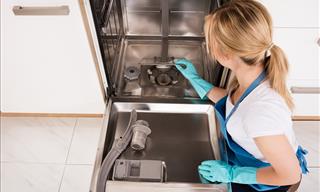
For the most part, canned and cooked beans are relatively comparable in their nutritional value, as dehydrated and cooked beans contain the same amount of protein, fat content, and mostly the same ingredients. However, there is one exception, and it's in favor of dried beans.

If convenience is the main thing you’re looking for, canned beans are undoubtedly easier to prepare than dried ones. Canned beans are soaked and ready-to-eat while dried beans usually have to soak overnight before being cooked.

If saving money is your priority, dried beans are almost always cheaper than canned. Canned beans are pre-cooked and stored in water, while dried beans are dehydrated and therefore they weigh less. After soaking or boiling your dried beans in water, they will end up weighing more, so ultimately, you will get more product for a lesser price if you buy a bag of dried beans rather than a single can of beans.

 13:29
13:29
What Makes Sandwich Bread so Different than Bakery Bread?
The imminent differences between sandwich bread and bakery bread has an effect on your health.

8 Persuasive Reasons You Should Drink Cabbage Juice...
Cabbage juice is full of nutrients, minerals, and antioxidants. Here are 8 amazing health benefits of this drink.
 5:28
5:28
Did You Know the Time of Day You Take Vitamin D Matters?
You should be more particular about the time of the day you take your vitamin D. Here's why.

Have You Ever Tried Duck Eggs? Here’s Why You Should
Duck eggs are becoming increasingly popular, and it turns out they are also highly nutritious even more so than chicken eggs.

Craving a Healthy Snack? Try One of These Delicious Combos
These surprising food pairings are not just delicious, but they are actually healthier when combined!
 13:42
13:42
Truth or Myth: Are Fruits as Sugary as Candy?
Here are 19 diet myths about debunked. Which one did you believe in?

Stunning! The Evolution of Beauty From 1952 to Today
Our definition of beauty may change as years go by but these pictures prove that true beauty is timeless.

How to Choose, Cook and Prepare a Perfect Steak!
Most of us want to know how to cook the perfect steak, and now, thanks to these fantastic guides, we can!
 8:08
8:08
Home Tip: Why I Put Aluminum Foil in My Toilet
In today's video, we're diving into one of those quirky life hacks that might just change the way you approach household maintenance.

13 Great Secret Hiding Spots That Burglars Will Never Find
Here are a few practical places to properly hide your cash and valuables from professional criminals.

Heed These Great Tips as They Might Save You One Day
Here are 7 simple tips that we should all know, because they may just save us some day.

What to Do if Someone is Drowning: The Complete Guide
Whether someone is a strong swimmer or not, drowning's always a potential risk. So you need to know how to deal with the situation. Here'a complete guide.

Useful Tips to Have Your Dishwasher Run Smoothly For Years
Just 15 minutes of occasional cleaning and maintenance can make sure your dishwasher runs smoothly for years.
 5:50
5:50
10 Fantastic Food Hacks To Try At Home
Make your culinary experience as good as it can be using these 10 neat little kitchen hacks.

How You Could Be Bringing Bed Bugs Into Your Home
Even if you don’t have a bed bug problem right now, you should be aware of the ways bed bugs can get in your home.

This Tip Collection is Amazingly Helpful!
You’ll be pleased to hear there are old wives' tales that are grounded in fact. This list of 9 true tales will help you get your house spic and span!

12 Surprising Ways to Use Your Box Grater
Did you know your box grater had such unique uses?

10 Things You SHOULDN'T Store on Top of Your Refrigerator
Learn why these items shouldn't be stored on the top of your fridge.
 9:20
9:20
Why Do We Pop Our Ears, and What if it Fails?
Dive into the mechanics of this necessary, yet often overlooked, bodily function of popping your ears.
 5:03
5:03
24 Simple But Genius Hanger Tricks to Use at Home!
Find out the many wonderful and useful tricks you can use a regular old hanger for!
 12:32
12:32
20 Foods That Help You Lose Belly Fat
Keep this list of 20 foods that fight belly fat future aid in your weight loss.

Using Vinegar to Clean These Items Can Really Damage Them
Cleaning these common home surfaces and other items with vinegar can seriously damage them...

This Is Why You Should Never Throw Out Silica Gel Packets
Have you ever thrown away these bags of silica gel? Of course you have. But here are some reasons why you SHOULD keep hold of them...
 6:01
6:01
I Usually Wake Up 3 A.M. to Pee. What's The Reason?
Do you find yourself waking up at around 3 a.m. every other night to pee? There’s a reason for it.

The 7 Biggest Mistakes You Can Make While Filing Taxes
Tax season is here. Make sure you don’t end up making these filing mistakes.
 9:36
9:36
10 of the Best Ways to Hide Money When Traveling!
In this video, you’ll see ten great ways to hide your money for that extra peace of mind.

10 Dog Winter Care Tips that'll Guarantee a Healthy Pet
The following list delves into ten pivotal areas of focus for dog owners, ensuring a comprehensive approach to winter dog care.
 7:46
7:46
Beginner’s Guide to Spices: Storage and Which You Must Get
There IS a right and wrong way to store and organize your spices. Whether you're a beginner or a spice fanatic, you'll find these tips useful!

DIY: Make Your Own Face Mask in a Few Easy Steps
To get around the shortage, you can make your own DIY surgical face mask. It can be easily done even if you're can't or don't want to sew.

Remove That Painful Splinter - With Handy Baking Soda
Splinters are more painful than paper cuts, and very painful to remove. But thanks to baking soda you can actually remove splinters easily. And here's how.

Items You Keep on the Kitchen Counter But Really Shouldn’t
Do you keep a knife holder on the kitchen counter? What about a jar with coffee or spices? Learn why that’s probably a bad idea...

Home-Made Wall Cleaners That Will Make Life Easier
Here are 10 easy fixes, recipes and solutions to help make cleaning your walls a simple and infrequent task.

Keep You Bathroom Clean & Tidy with these 15 Tips
These great tricks will help you keep your bathroom clean and your experience in it enjoyable and comfy. Is there a place you need to feel more at your ease? Here are 15 bathroom secrets we'd like to share.
 2:28
2:28
8 Super Handy Grocery Bag Tips You Have to Try
Whether you prefer paper or plastic, there are enough hacks here to really boost your bag usage. These tips will save you time, money and space. Perfect!
 11:42
11:42
The Ultimate Summer Life Hacks Explained
Dive into these essential hacks to elevate your summer experience!

Keep Spiders Out of Your Home with This Helpful Guide
Here are nine effective ways to keep spiders out of your home:

Dog Can't Stay Alone? 5 Tips to Help Resolve Their Anxiety
When your dog shows anxiety when left alone, here are some tips to help you deal with the problem.

Waste No More: 6 Great Ways to Use Fruit & Veggie Peels
If you want to save both money and reduce your waste, remember these 6 practical and delicious ideas for what you can do to utilize your fruit and vegetable leftovers to the max.

12 Amazing Home Fire Safety Tips From Firefighters
Don't let a fire get out of hand. Keep these essential 12 tips in mind.

More Seniors Should Wear Smartwatches, Here's Why
Smartwatches aren’t just for fitness enthusiasts; it can make for the perfect gift for seniors. Here’s why…
 3:33
3:33
Quick Tip: Clean the Gunk Out of Your Kitchen Cupboards!
A quick tutorial that teaches how to clean your kitchen cupboards without damaging them.

Solve 18 Cooking and Food Storage Problems With These Tips
These 18 food tips will teach you how to prevent food from spoiling and will show you how to save time and effort in preparing certain foods

7 Mistakes We Generally Make While Arranging Furniture
Here's a look at some furniture arranging mistakes you should always avoid and how you can fix them.

Follow These 3 Easy Steps to Ripen an Avocado in Minutes
This foolproof trick will make your rock hard avocado soft and creamy in mere minutes. Just follow these simple instructions...

Olive Oil Has so Many Different Uses - Here Are 25 of Them
Olive oil has so many different uses it's unreal. Here are 25 uses of olive oil that you may not have heard of!

10 Ways to Get Rid of Black Circles and that Puffy Look
Had enough of looking tired? Try our natural recipes to rid yourself of that tired look.

Waking Up at Odd Hours? Here's What Your Body is Saying
This guide will help you understand how your body systems work and identify any mental challenges you may face.


